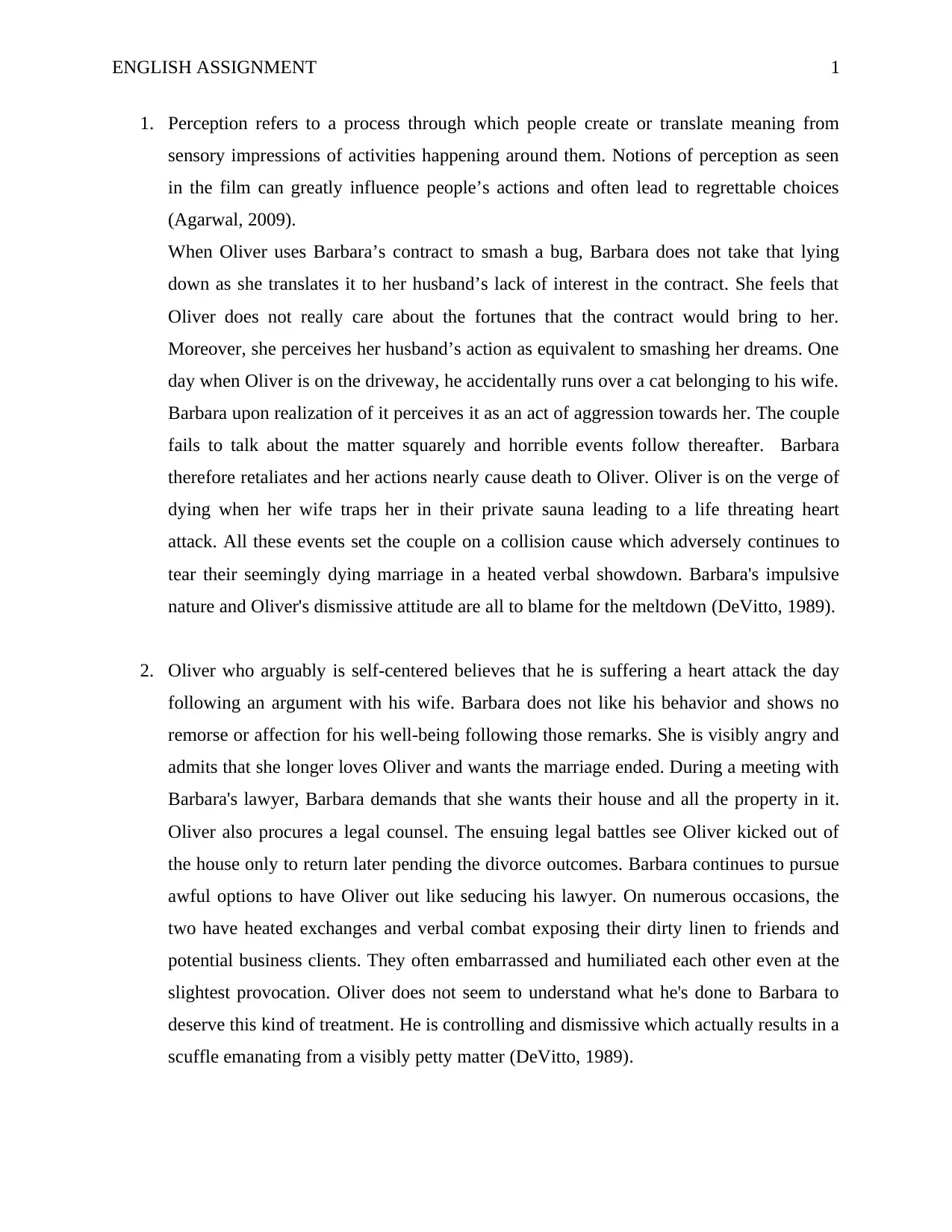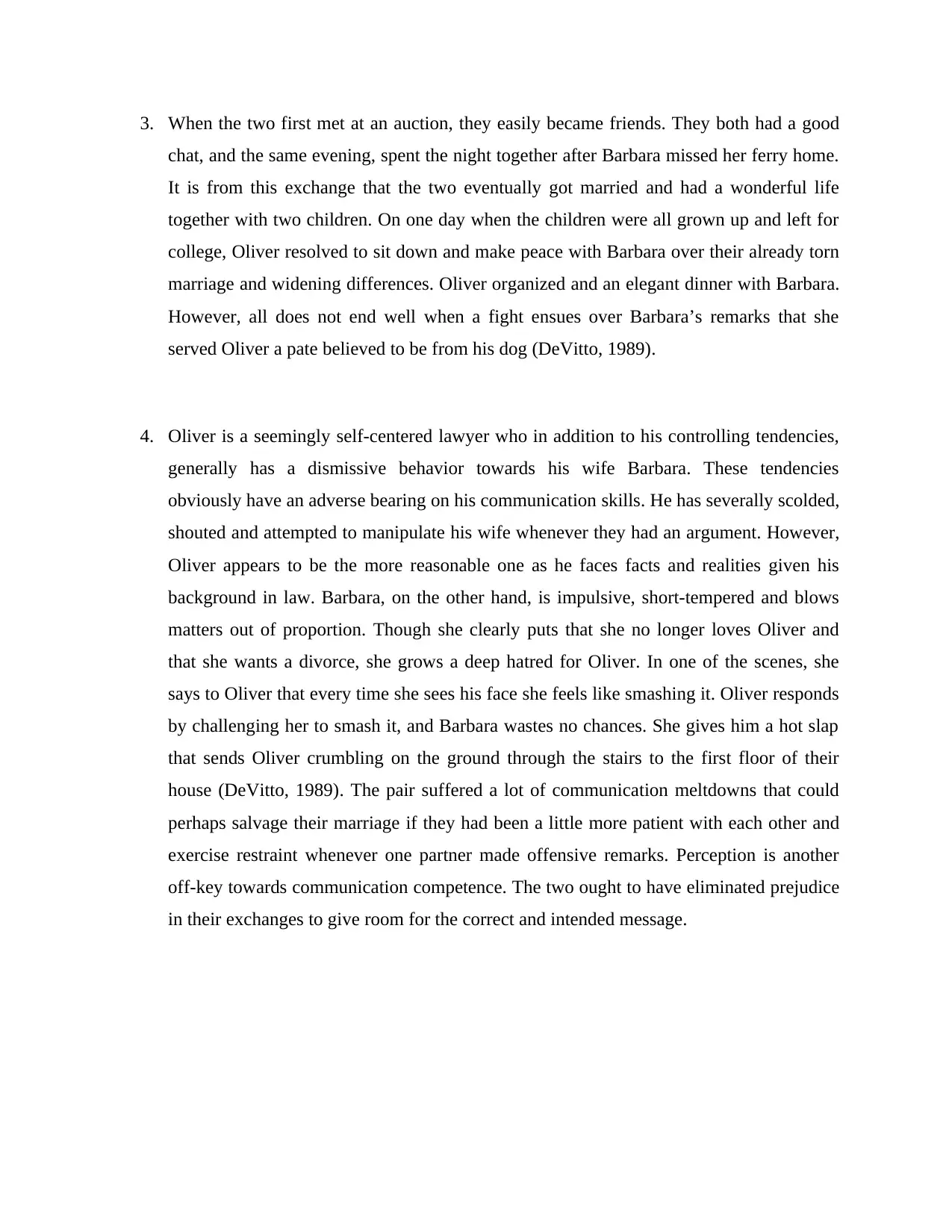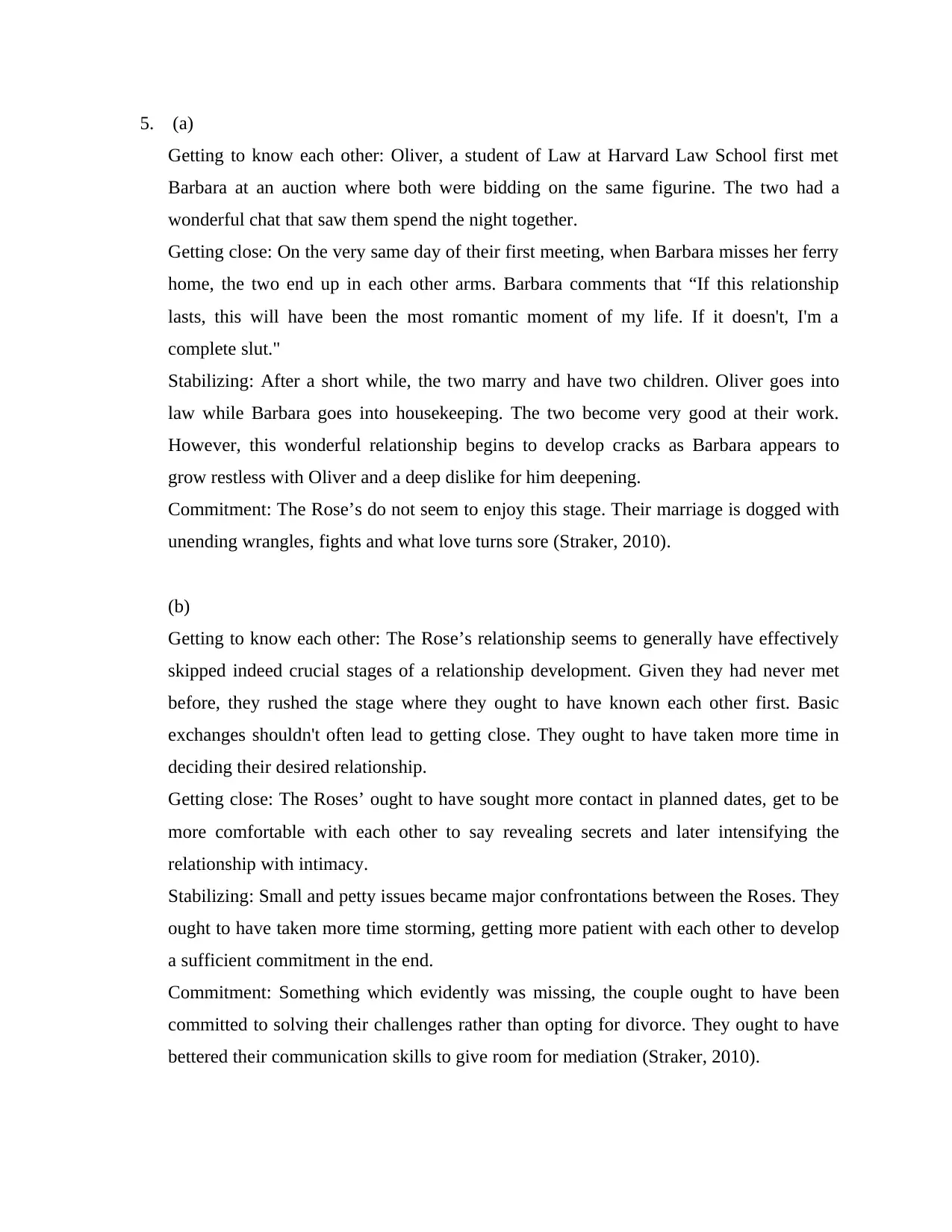English Assignment: Perception, Communication, and Relationships
VerifiedAdded on 2023/06/09
|4
|1317
|381
Essay
AI Summary
This English assignment analyzes the role of perception and communication in the breakdown of a marriage, using the film 'The War of the Roses' as a case study. The essay examines how misinterpretations, impulsive behavior, and dismissive attitudes contribute to conflict and ultimately, the disintegration of the relationship. It explores specific instances where miscommunication and differing perceptions lead to escalating arguments, legal battles, and emotional distress. The assignment also delves into the stages of relationship development, highlighting where the couple faltered and suggesting improvements in communication skills and conflict resolution strategies. References from various authors are used to support the analysis.

ENGLISH ASSIGNMENT 1
1. Perception refers to a process through which people create or translate meaning from
sensory impressions of activities happening around them. Notions of perception as seen
in the film can greatly influence people’s actions and often lead to regrettable choices
(Agarwal, 2009).
When Oliver uses Barbara’s contract to smash a bug, Barbara does not take that lying
down as she translates it to her husband’s lack of interest in the contract. She feels that
Oliver does not really care about the fortunes that the contract would bring to her.
Moreover, she perceives her husband’s action as equivalent to smashing her dreams. One
day when Oliver is on the driveway, he accidentally runs over a cat belonging to his wife.
Barbara upon realization of it perceives it as an act of aggression towards her. The couple
fails to talk about the matter squarely and horrible events follow thereafter. Barbara
therefore retaliates and her actions nearly cause death to Oliver. Oliver is on the verge of
dying when her wife traps her in their private sauna leading to a life threating heart
attack. All these events set the couple on a collision cause which adversely continues to
tear their seemingly dying marriage in a heated verbal showdown. Barbara's impulsive
nature and Oliver's dismissive attitude are all to blame for the meltdown (DeVitto, 1989).
2. Oliver who arguably is self-centered believes that he is suffering a heart attack the day
following an argument with his wife. Barbara does not like his behavior and shows no
remorse or affection for his well-being following those remarks. She is visibly angry and
admits that she longer loves Oliver and wants the marriage ended. During a meeting with
Barbara's lawyer, Barbara demands that she wants their house and all the property in it.
Oliver also procures a legal counsel. The ensuing legal battles see Oliver kicked out of
the house only to return later pending the divorce outcomes. Barbara continues to pursue
awful options to have Oliver out like seducing his lawyer. On numerous occasions, the
two have heated exchanges and verbal combat exposing their dirty linen to friends and
potential business clients. They often embarrassed and humiliated each other even at the
slightest provocation. Oliver does not seem to understand what he's done to Barbara to
deserve this kind of treatment. He is controlling and dismissive which actually results in a
scuffle emanating from a visibly petty matter (DeVitto, 1989).
1. Perception refers to a process through which people create or translate meaning from
sensory impressions of activities happening around them. Notions of perception as seen
in the film can greatly influence people’s actions and often lead to regrettable choices
(Agarwal, 2009).
When Oliver uses Barbara’s contract to smash a bug, Barbara does not take that lying
down as she translates it to her husband’s lack of interest in the contract. She feels that
Oliver does not really care about the fortunes that the contract would bring to her.
Moreover, she perceives her husband’s action as equivalent to smashing her dreams. One
day when Oliver is on the driveway, he accidentally runs over a cat belonging to his wife.
Barbara upon realization of it perceives it as an act of aggression towards her. The couple
fails to talk about the matter squarely and horrible events follow thereafter. Barbara
therefore retaliates and her actions nearly cause death to Oliver. Oliver is on the verge of
dying when her wife traps her in their private sauna leading to a life threating heart
attack. All these events set the couple on a collision cause which adversely continues to
tear their seemingly dying marriage in a heated verbal showdown. Barbara's impulsive
nature and Oliver's dismissive attitude are all to blame for the meltdown (DeVitto, 1989).
2. Oliver who arguably is self-centered believes that he is suffering a heart attack the day
following an argument with his wife. Barbara does not like his behavior and shows no
remorse or affection for his well-being following those remarks. She is visibly angry and
admits that she longer loves Oliver and wants the marriage ended. During a meeting with
Barbara's lawyer, Barbara demands that she wants their house and all the property in it.
Oliver also procures a legal counsel. The ensuing legal battles see Oliver kicked out of
the house only to return later pending the divorce outcomes. Barbara continues to pursue
awful options to have Oliver out like seducing his lawyer. On numerous occasions, the
two have heated exchanges and verbal combat exposing their dirty linen to friends and
potential business clients. They often embarrassed and humiliated each other even at the
slightest provocation. Oliver does not seem to understand what he's done to Barbara to
deserve this kind of treatment. He is controlling and dismissive which actually results in a
scuffle emanating from a visibly petty matter (DeVitto, 1989).
Paraphrase This Document
Need a fresh take? Get an instant paraphrase of this document with our AI Paraphraser

3. When the two first met at an auction, they easily became friends. They both had a good
chat, and the same evening, spent the night together after Barbara missed her ferry home.
It is from this exchange that the two eventually got married and had a wonderful life
together with two children. On one day when the children were all grown up and left for
college, Oliver resolved to sit down and make peace with Barbara over their already torn
marriage and widening differences. Oliver organized and an elegant dinner with Barbara.
However, all does not end well when a fight ensues over Barbara’s remarks that she
served Oliver a pate believed to be from his dog (DeVitto, 1989).
4. Oliver is a seemingly self-centered lawyer who in addition to his controlling tendencies,
generally has a dismissive behavior towards his wife Barbara. These tendencies
obviously have an adverse bearing on his communication skills. He has severally scolded,
shouted and attempted to manipulate his wife whenever they had an argument. However,
Oliver appears to be the more reasonable one as he faces facts and realities given his
background in law. Barbara, on the other hand, is impulsive, short-tempered and blows
matters out of proportion. Though she clearly puts that she no longer loves Oliver and
that she wants a divorce, she grows a deep hatred for Oliver. In one of the scenes, she
says to Oliver that every time she sees his face she feels like smashing it. Oliver responds
by challenging her to smash it, and Barbara wastes no chances. She gives him a hot slap
that sends Oliver crumbling on the ground through the stairs to the first floor of their
house (DeVitto, 1989). The pair suffered a lot of communication meltdowns that could
perhaps salvage their marriage if they had been a little more patient with each other and
exercise restraint whenever one partner made offensive remarks. Perception is another
off-key towards communication competence. The two ought to have eliminated prejudice
in their exchanges to give room for the correct and intended message.
chat, and the same evening, spent the night together after Barbara missed her ferry home.
It is from this exchange that the two eventually got married and had a wonderful life
together with two children. On one day when the children were all grown up and left for
college, Oliver resolved to sit down and make peace with Barbara over their already torn
marriage and widening differences. Oliver organized and an elegant dinner with Barbara.
However, all does not end well when a fight ensues over Barbara’s remarks that she
served Oliver a pate believed to be from his dog (DeVitto, 1989).
4. Oliver is a seemingly self-centered lawyer who in addition to his controlling tendencies,
generally has a dismissive behavior towards his wife Barbara. These tendencies
obviously have an adverse bearing on his communication skills. He has severally scolded,
shouted and attempted to manipulate his wife whenever they had an argument. However,
Oliver appears to be the more reasonable one as he faces facts and realities given his
background in law. Barbara, on the other hand, is impulsive, short-tempered and blows
matters out of proportion. Though she clearly puts that she no longer loves Oliver and
that she wants a divorce, she grows a deep hatred for Oliver. In one of the scenes, she
says to Oliver that every time she sees his face she feels like smashing it. Oliver responds
by challenging her to smash it, and Barbara wastes no chances. She gives him a hot slap
that sends Oliver crumbling on the ground through the stairs to the first floor of their
house (DeVitto, 1989). The pair suffered a lot of communication meltdowns that could
perhaps salvage their marriage if they had been a little more patient with each other and
exercise restraint whenever one partner made offensive remarks. Perception is another
off-key towards communication competence. The two ought to have eliminated prejudice
in their exchanges to give room for the correct and intended message.

5. (a)
Getting to know each other: Oliver, a student of Law at Harvard Law School first met
Barbara at an auction where both were bidding on the same figurine. The two had a
wonderful chat that saw them spend the night together.
Getting close: On the very same day of their first meeting, when Barbara misses her ferry
home, the two end up in each other arms. Barbara comments that “If this relationship
lasts, this will have been the most romantic moment of my life. If it doesn't, I'm a
complete slut."
Stabilizing: After a short while, the two marry and have two children. Oliver goes into
law while Barbara goes into housekeeping. The two become very good at their work.
However, this wonderful relationship begins to develop cracks as Barbara appears to
grow restless with Oliver and a deep dislike for him deepening.
Commitment: The Rose’s do not seem to enjoy this stage. Their marriage is dogged with
unending wrangles, fights and what love turns sore (Straker, 2010).
(b)
Getting to know each other: The Rose’s relationship seems to generally have effectively
skipped indeed crucial stages of a relationship development. Given they had never met
before, they rushed the stage where they ought to have known each other first. Basic
exchanges shouldn't often lead to getting close. They ought to have taken more time in
deciding their desired relationship.
Getting close: The Roses’ ought to have sought more contact in planned dates, get to be
more comfortable with each other to say revealing secrets and later intensifying the
relationship with intimacy.
Stabilizing: Small and petty issues became major confrontations between the Roses. They
ought to have taken more time storming, getting more patient with each other to develop
a sufficient commitment in the end.
Commitment: Something which evidently was missing, the couple ought to have been
committed to solving their challenges rather than opting for divorce. They ought to have
bettered their communication skills to give room for mediation (Straker, 2010).
Getting to know each other: Oliver, a student of Law at Harvard Law School first met
Barbara at an auction where both were bidding on the same figurine. The two had a
wonderful chat that saw them spend the night together.
Getting close: On the very same day of their first meeting, when Barbara misses her ferry
home, the two end up in each other arms. Barbara comments that “If this relationship
lasts, this will have been the most romantic moment of my life. If it doesn't, I'm a
complete slut."
Stabilizing: After a short while, the two marry and have two children. Oliver goes into
law while Barbara goes into housekeeping. The two become very good at their work.
However, this wonderful relationship begins to develop cracks as Barbara appears to
grow restless with Oliver and a deep dislike for him deepening.
Commitment: The Rose’s do not seem to enjoy this stage. Their marriage is dogged with
unending wrangles, fights and what love turns sore (Straker, 2010).
(b)
Getting to know each other: The Rose’s relationship seems to generally have effectively
skipped indeed crucial stages of a relationship development. Given they had never met
before, they rushed the stage where they ought to have known each other first. Basic
exchanges shouldn't often lead to getting close. They ought to have taken more time in
deciding their desired relationship.
Getting close: The Roses’ ought to have sought more contact in planned dates, get to be
more comfortable with each other to say revealing secrets and later intensifying the
relationship with intimacy.
Stabilizing: Small and petty issues became major confrontations between the Roses. They
ought to have taken more time storming, getting more patient with each other to develop
a sufficient commitment in the end.
Commitment: Something which evidently was missing, the couple ought to have been
committed to solving their challenges rather than opting for divorce. They ought to have
bettered their communication skills to give room for mediation (Straker, 2010).
⊘ This is a preview!⊘
Do you want full access?
Subscribe today to unlock all pages.

Trusted by 1+ million students worldwide

REFERENCES
Adler, W. (1981). The War of The Roses. New York: Warner Books Inc.
Agarwal, K. (2009). Perception Management. New Delhi: Global India Publications Pvt Ltd.
DeVitto, D. (Director). (1989). The War of the Roses [Motion Picture].
Straker, D. (2010). Changing Minds: in Detail. Crowthorne: Syque Press.
Adler, W. (1981). The War of The Roses. New York: Warner Books Inc.
Agarwal, K. (2009). Perception Management. New Delhi: Global India Publications Pvt Ltd.
DeVitto, D. (Director). (1989). The War of the Roses [Motion Picture].
Straker, D. (2010). Changing Minds: in Detail. Crowthorne: Syque Press.
1 out of 4
Your All-in-One AI-Powered Toolkit for Academic Success.
+13062052269
info@desklib.com
Available 24*7 on WhatsApp / Email
![[object Object]](/_next/static/media/star-bottom.7253800d.svg)
Unlock your academic potential
Copyright © 2020–2026 A2Z Services. All Rights Reserved. Developed and managed by ZUCOL.